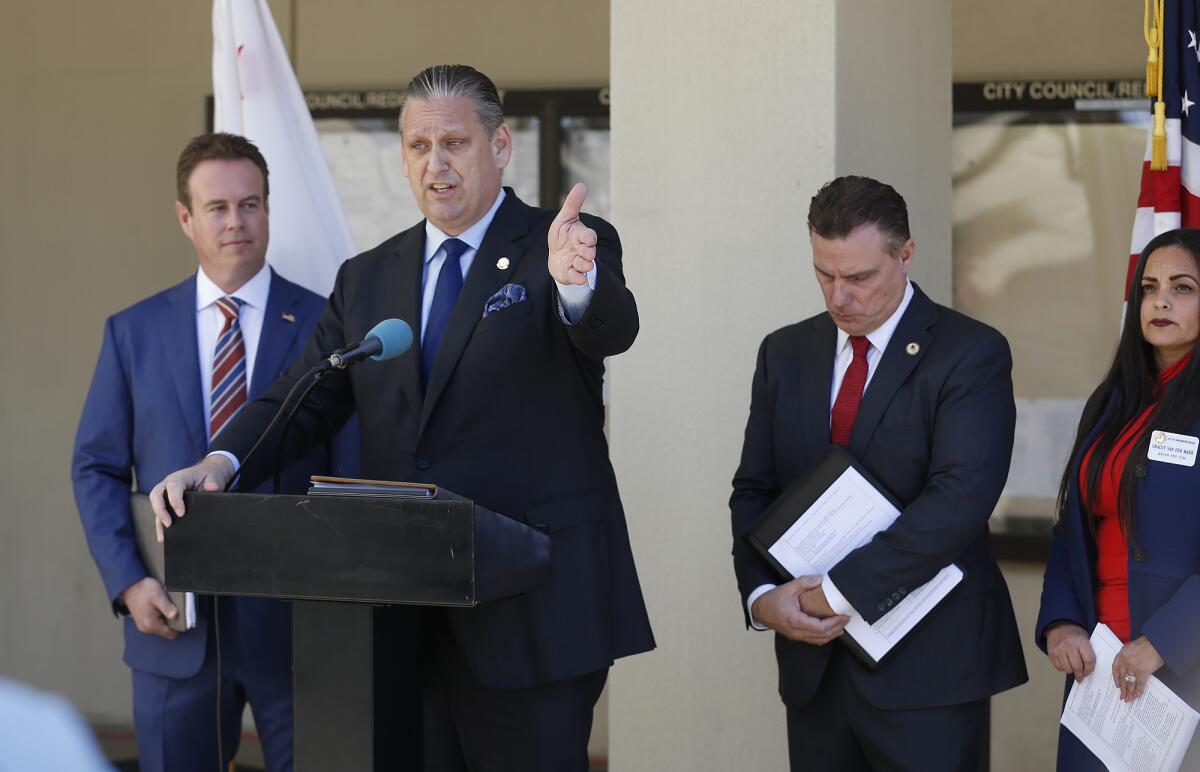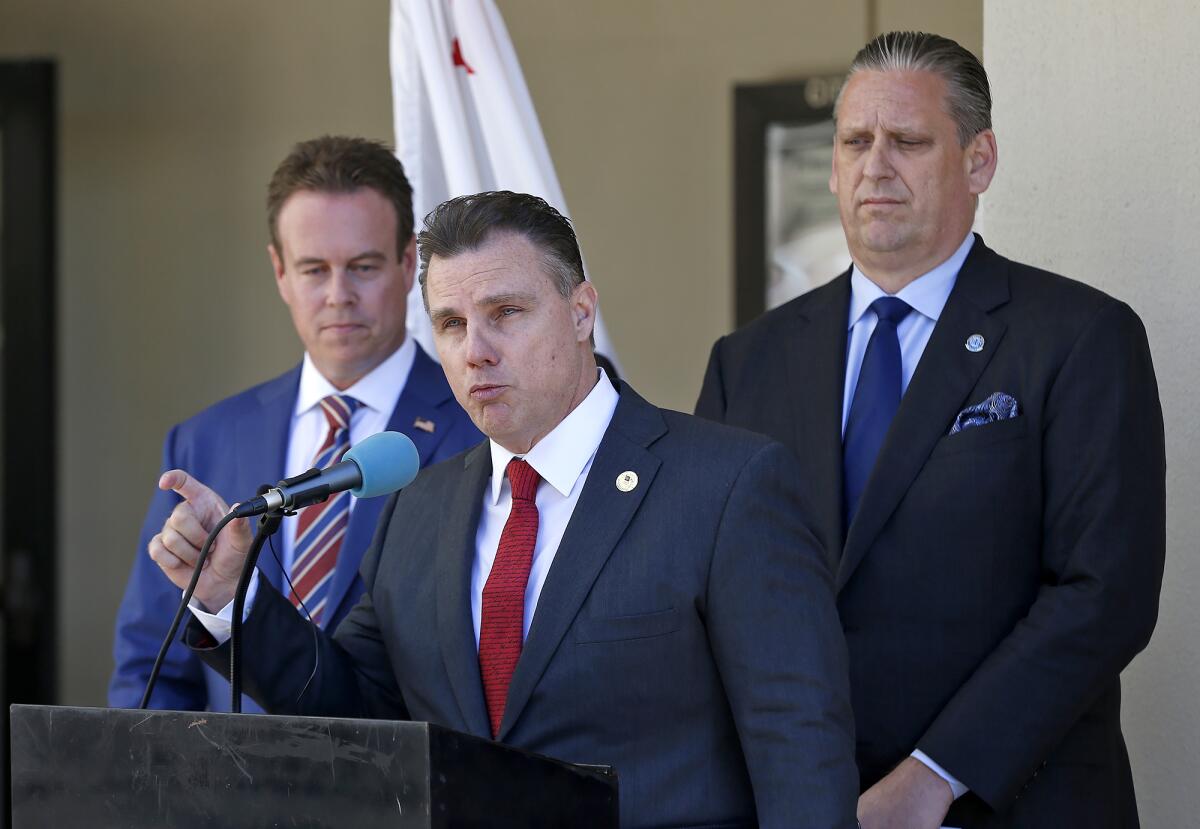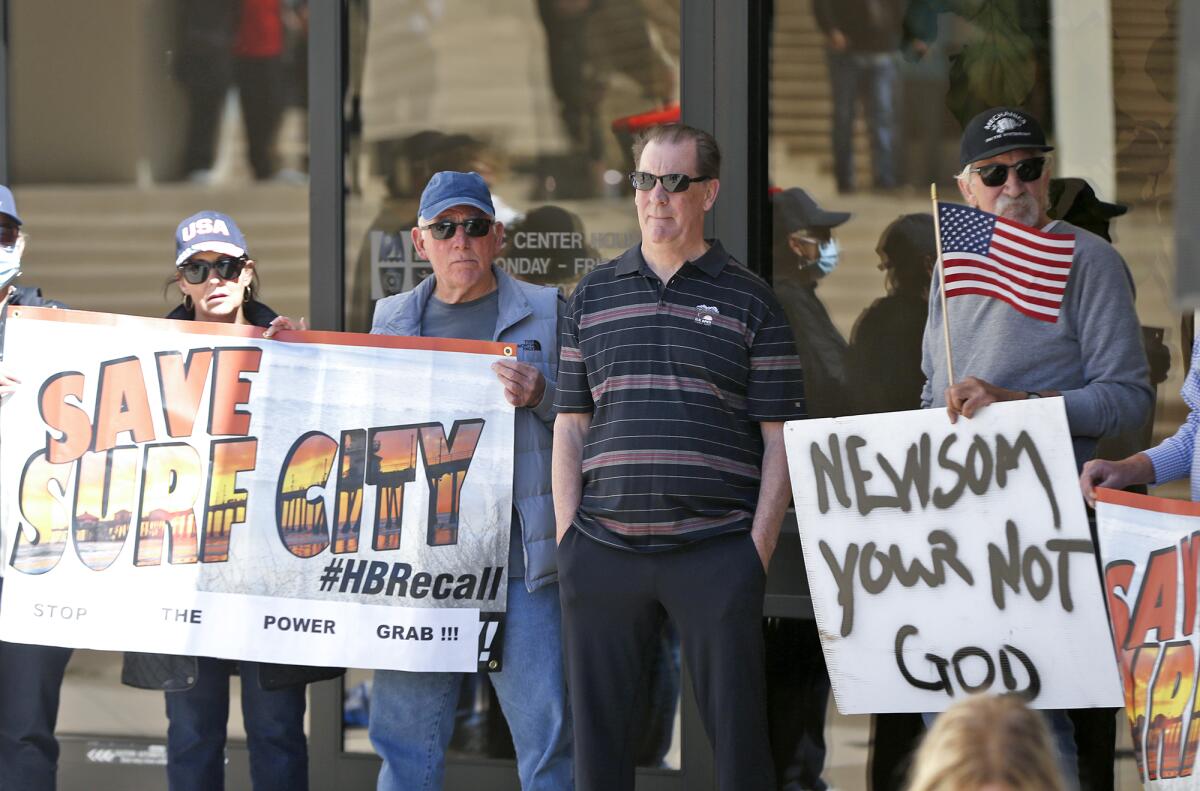Huntington Beach, state of California file lawsuits against each other over housing issues

- Share via
The gloves are off.
The state of California and city of Huntington Beach are both turning to the courts in their battle over separate but related housing issues.
California Atty. Gen. Rob Bonta and the Department of Housing and Community Development filed a lawsuit in Orange County Superior Court against the city of Huntington Beach on Wednesday, alleging that the city has been violating state housing laws by not accepting new applications for Accessory Dwelling Units, sometimes called “granny flats.”
“As our state faces an existential housing crisis, we won’t stand idly by as local governments knowingly flout state law meant to protect our communities and bring much needed affordable housing to the people of California,” Bonta said in a statement. “Huntington Beach’s latest moves fly in the face of the law, stifle affordable housing projects and infringe on the rights of private property owners in their own community.”
Less than 24 hours later, Huntington Beach City Atty. Michael Gates revealed at a press conference at City Hall Thursday that the city has filed a federal lawsuit against state leaders, including Gov. Gavin Newsom, in U.S. District Court. The 59-page lawsuit claims that state housing laws, including Regional Housing Needs Assessment zoning requirements, violate the city’s rights to zone property.

The council again discussed ADUs on Tuesday night. In closed session, they decided not to sue the state over the issue, though the topic is expected to be revisited at the next meeting on March 21.
Councilman Pat Burns’ original agenda item stated that the city would not process ADU applications until litigation or adjudication were finished. Since the city decided not to sue, ADU applications began being approved again as of Thursday morning.
Still, new applications were not accepted by the city in the time period between Burns’ original agenda item on Feb. 21 and this week, though about 100 applications already in the pipeline continued to be processed. Strickland, Mayor Pro Tem Gracey Van Der Mark and Councilmen Casey McKeon and Burns supported the original item stopping the processing of ADUs, with council members Natalie Moser, Rhonda Bolton and Dan Kalmick voting no.
“I sure don’t want Sacramento telling us to how to rezone our neighborhoods from single-family residential, to oh, granny flats, where a lot of these people are just going to ... rent it out,” Burns said at Tuesday night’s meeting. “They can give their grandma a room in the house, like I did. That’s where my mother-in-law stayed, and I had no problem with it, but it changes the dynamics of neighborhoods with ADUs put in them.”
Bonta said in a virtual press conference Thursday that the stoppage of ADU processing violated state housing law. He added that a proposed “builder’s remedy” ban, which also passed 4-3 on Tuesday, would also be in violation of state housing law.

The builder’s remedy ordinance, which would stop developers from bypassing zoning restrictions because Huntington Beach’s housing element is not yet in compliance, passed 4-3 Tuesday with the same vote breakdown. It has a second reading scheduled for the next City Council meeting on March 21.
“[Huntington Beach] singled themselves out,” Bonta said Thursday. “They are not the victim. They are the violator of the law.”
Huntington Beach has been at war with the state for years over housing laws. In 2019 the state sued Surf City, with a settlement reached in January 2020 after the city agreed to zone for more low-income housing.
The previous council voted against suing the state over RHNA numbers in April 2021, but the current majority ran last year on a platform that included challenging Sacramento and reasserting local control.
The current fight comes as the city has yet to certify a compliant housing element, though city leaders plan to address the issue on March 21, Strickland said.
Newsom, also on the press conference, called Huntington Beach “Exhibit A in what’s wrong with housing in the state of California.”
“[The council majority] is playing some kind of game ... but affordable housing is not a game,” Newsom said. “The dream is not a political football.”
The city’s RHNA number of 13,368 units zoned for in the current cycle must include a percentage of low-income housing, per the state’s guidelines.
Gates introduced his lawsuit, filed Thursday, in a press conference also including Strickland, Van Der Mark and McKeon.
Some residents held signs in support, like “We love local control” and “Newsom your [sic] not God.” One woman in opposition held a sign that read, “Mayor Scofflaw.”
Strickland noted that last year, acting California State Auditor Michael Tilden released a report that called the state’s RHNA methodology largely flawed.
“While the state’s agenda is to cram a million units of housing into far less than 5% of the state’s territory, we know that neither the state nor Gavin Newsom are serious about actually producing more housing,” Strickland said. “Their goal is to urbanize quiet private-property-owning communities. This lawsuit filed by our city attorney today is the first major step in taking the governor and the state to task over their faulty narratives about housing, and their unconstitutional legislative and administrative means of stripping charter cities of their abilities to make their own decisions.”
Gates said the supposed RHNA mandates for Huntington Beach are not mandates at all, because the numbers from the Department of Housing and Community Development cannot have preemptive power over Huntington Beach’s charter city home-rule authority.
Because the suit is a federal one, it invokes the U.S. Constitution, alleging that California has violated the city’s 1st Amendment protection for compelled speech and 14th Amendment due process protections.
“If the state is left unchecked, then quite frankly the state will be micromanaging and making every local zoning decision from here on,” Gates said. “That has to stop. In California, a charter city can evoke its right to make its own determinations on land use, and that’s a constitutional provision that supersedes state legislation.”
Huntington Beach resident Jessamyn Garner is the director of communications for YIMBY (Yes In My Back Yard) Action.
Garner attended Thursday’s press conference and said a lack of affordable housing has hurt the city, and ADUs could help matters.
“Especially as an LGBTQ person in the community, I don’t really feel welcome here,” Garner said. “I don’t even go downtown because I just don’t feel comfortable being verbally harassed in public spaces. By making these housing decisions, I’m constantly watching my rent go up every year. That makes me feel like they don’t want to make space for people like me.
“I don’t really have the financial opportunity to start a family, even if I wanted to start one, in this city. Housing costs are too high.”
All the latest on Orange County from Orange County.
Get our free TimesOC newsletter.
You may occasionally receive promotional content from the Daily Pilot.




